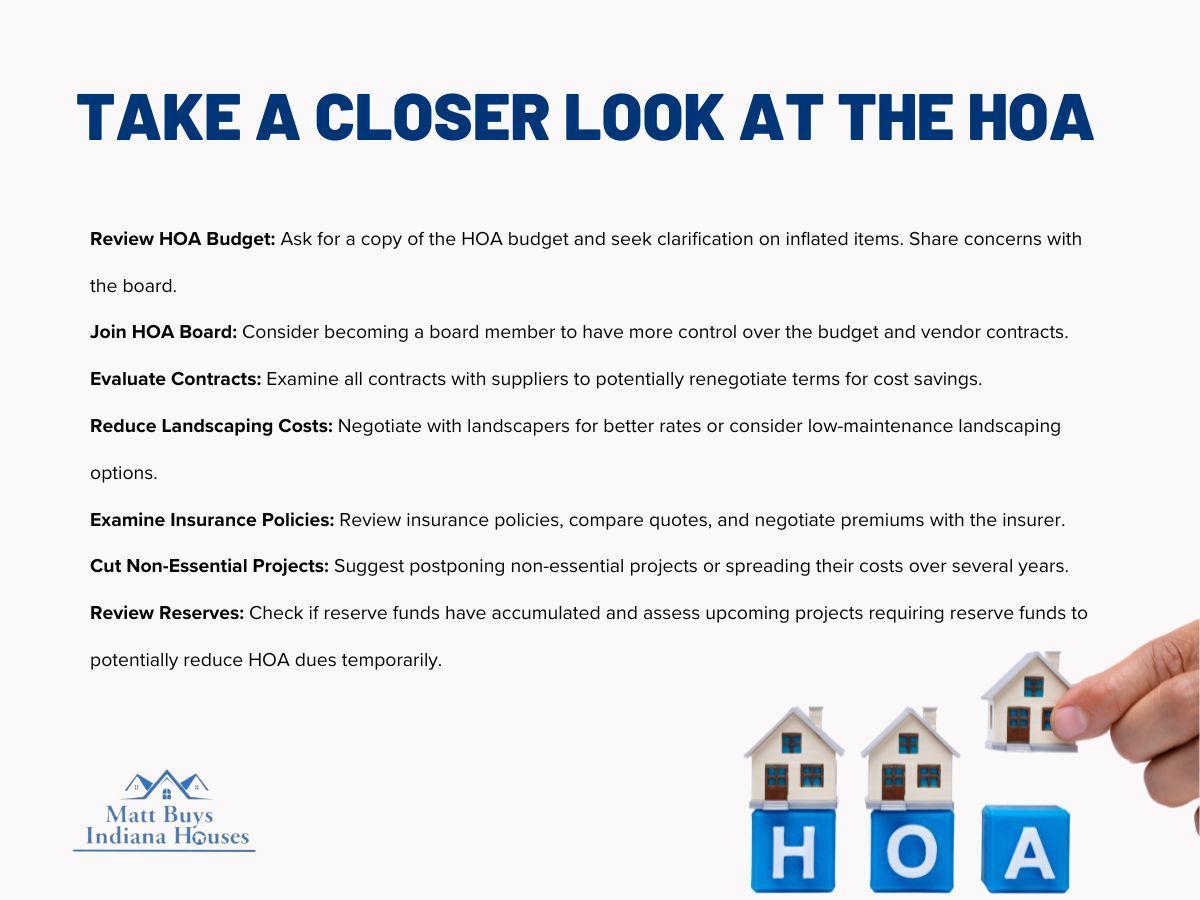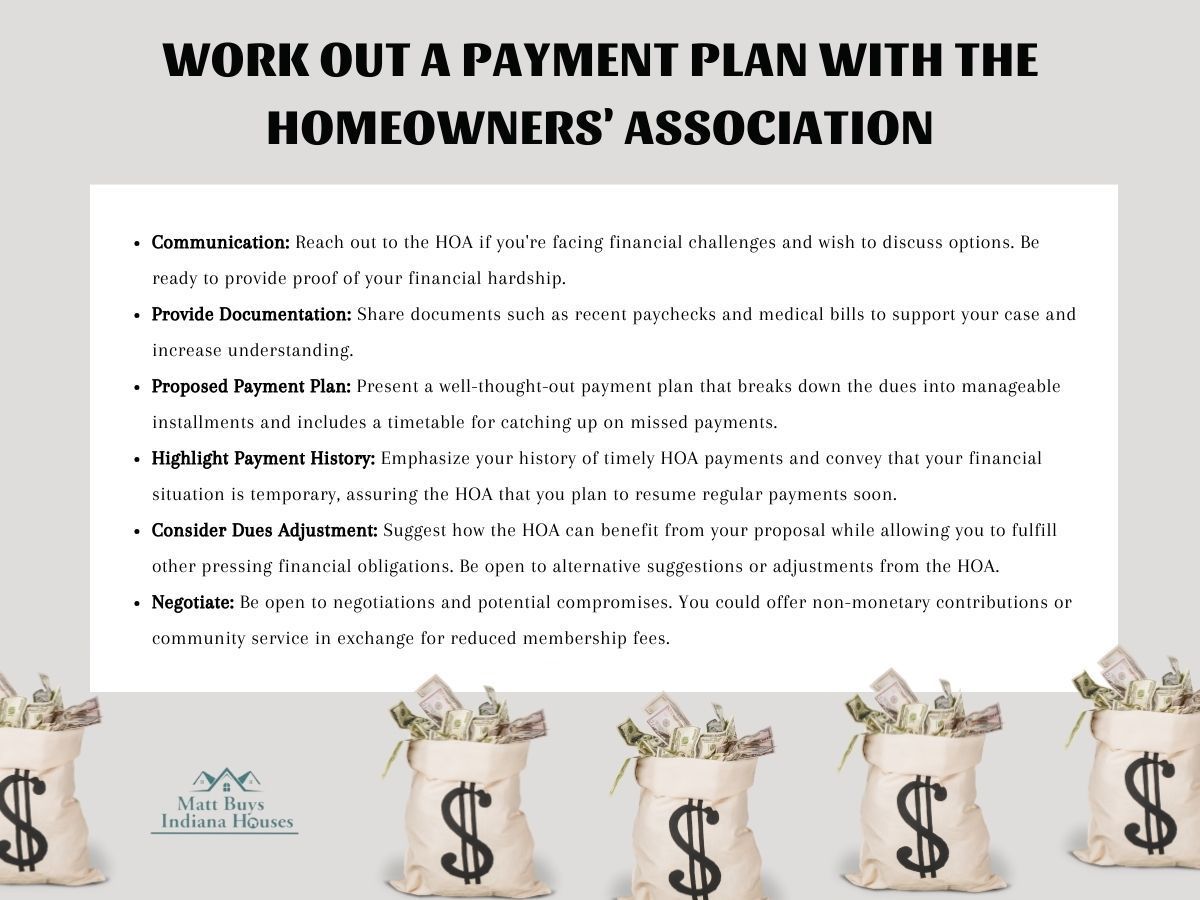How To Get Out of Paying HOA Dues
November 6, 2023
When moving into an area with an HOA, the benefits sometimes outweigh the negatives, but after some time, they catch up, for example, the countless HOA fees that may sometimes not even make sense to you. Most of the time, when an HOA becomes an unpleasant presence in your life, the simplest thing to do may be to sell your house and leave.
But is this the only solution? What if there are ways to get out of paying HOA dues while still maintaining your home? This article aims not to provide legal advice but to guide you on how you can go about dealing with the cumbersome HOA fees.
What are Homeowners Association (HOA) Dues?
Homeowners in a community or neighborhood are obligated to pay regular fees known as homeowners association (HOA) dues. The fees collected from residents are put toward the upkeep of the neighborhood's shared spaces and facilities.
HOA fees are collected to sustain and improve community amenities, including landscaping, swimming pools, fitness facilities, and security services for the benefit of all homeowners.
Typically, HOA dues are governed by the governing papers of the association and are set at a level that covers the anticipated costs of maintaining the community. These dues vary depending on community size, amenities, and continuing expenses like landscaping, insurance, and emergency repairs.
Do You Need To Pay HOA Fees?
Homeowners should recognize that HOA dues help sustain the community's well-being, property values, and amenities. Non-paying homeowners may lose community amenities and services.
In a neighborhood with shared amenities, HOA dues are important, but financial hardship can make it difficult for some residents to pay. However, intentionally avoiding HOA dues might have serious implications.
Late payments may result in late fees and penalties, and the association may lien the property or file for foreclosure. It can damage a homeowner's credit, lead to legal action, and hurt the association's finances. Without sufficient finances, the association may struggle to cover recurring and unforeseen expenses, lowering community services and amenities.
Exploring Other Options to Avoid Paying HOA Dues
Living in a community governed by a homeowners association (HOA) comes with its own set of rules and regulations. However, many homeowners may find themselves confused or frustrated by the intricacies of these rules.
While it's important to understand the consequences of not paying HOA dues, there may be situations where homeowners find themselves in financial hardship or disagree with certain aspects of their HOA's operations. It's crucial to strike a balance between addressing personal concerns and fulfilling your financial obligations to avoid potential negative repercussions.
1. Take A Closer Look At The HOA
As a member of the HOA, there are a number of things you can do to first work out a way around the high HOA dues you may be paying. Before pursuing any course of action, it's advisable to thoroughly understand your HOA's rules and be a responsible and active member of the HOA community.
Some of the actions you can take are:

Ask To See The Hoa Budget
You have the right as a homeowner or condo owner in a HOA to ask to see the budget at any time. Since most HOAs have a board that handles the finances and other activities, you should get a copy and check to see the allocations.
Ask the HOA president or another board member for clarification if you need it. Bring your concerns about any inflated budget items to the board for consideration
Join The Hoa Board
Instead of directing your issues to the HOA board, you can get directly involved by joining the board yourself if you have some spare time on your hands. That way, you'll have greater leeway and scope to examine the budget.
If elected to the HOA board, you will have the opportunity to manage the association's finances and negotiate contracts with outside vendors such as landscapers and security firms. This can shed light on the whereabouts of the funds in question.
Look At All Of The Hoa's Contracts
There are typically many agreements between a HOA and its various suppliers. There is always a property management business, and there could be others responsible for things like landscaping and pool upkeep.
Many of these independent contractors will be bound by contracts or agreements that date back decades. By renegotiating these conditions, they might be able to get the HOA better terms and, hence, a smaller expenditure.
Cut Landscaping Costs
When it comes to landscaping and gardening, how much does your HOA spend? It's possible that your landscaper is charging you too much because they've worked with the HOA for so long. An attractive neighborhood boosts home values, but the board should consider whether it's worth maintaining large grounds frequently.
If the HOA's budget has been cut, you can either try to negotiate with the landscaper or find a strategy to lessen the frequency of services. It is also possible to swap out high-maintenance plants and trees for low-maintenance ones without sacrificing aesthetics.
Examine The Insurance Policies
Insurance premiums account for a sizable portion of any HOA's budget, but luckily, either the present policy can be canceled, or the HOA can bargain with its insurer. You should discuss this with the HOA since it is usually not a deal breaker, and the board may even include an insurance professional who can help you negotiate.
Ensure you're not paying too much for insurance by comparing quotes from many providers. If estimates are much lower, talk with your existing insurance company to drop their costs to match the competition. If they won't, consider switching insurers.
Reduce Non-Essential Projects
Many of the expenses covered by HOA fees are optional extras. Such maintenance can involve replacing air conditioning units or doing other tasks that only arise once every few years.
If they are included in the present budget, you may want to propose postponing them or establishing a new schedule for them every few years. It's a method for delaying payments, which can result in lower monthly HOA dues.
Reduce Reserves
For unforeseen costs, many HOAs have a reserve fund. There is no reason to let this excess cash stay in an account if it is not being used, so checking on these reserves to see if they have accumulated is a smart idea.
You should also review your reserve studies to determine if there are any large projects coming up that will necessitate the use of your reserve cash. That way, you can cut back on HOA dues for a period without jeopardizing your financial stability.
2. Negotiate with the Homeowners' Association
If you are having trouble paying your homeowners association (HOA) dues, talking to the HOA about possible payment arrangements is a good first step.
Here are some suggestions to help you negotiate successfully:
Understand the HOA's Perspective
Before entering into negotiations, it's essential to understand the HOA's point of view. Familiarize yourself with the HOA's governing documents, rules, and regulations to better grasp their financial obligations and responsibilities which will give you insight into what the HOA may be willing to consider during negotiations.
Communicate Openly
Reach out to the HOA board or property management company to express your financial concerns since communicating openly about your situation can help foster understanding and empathy.
Be prepared to provide documentation or proof of your financial hardship, such as recent pay stubs, medical bills, or other relevant information to support your case.
Present a Proposed Payment Plan
When negotiating with the HOA, come prepared with a well-thought-out payment plan that offers a reasonable solution for both parties.
Offer a timeline for catching up on your dues, breaking down the outstanding balance into manageable installments, and presenting a structured plan to demonstrate your commitment to meeting your financial obligations while addressing your current hardships.
Highlight Your History of Timely Payments
If you have a track record of consistently paying your dues on time, emphasize this during negotiations.
Emphasize how your current financial situation is temporary and that you fully intend to resume regular payments as soon as possible, as this history can help build credibility and strengthen your case for negotiation.
Propose Temporary Reduction or Suspension of Dues
If your financial hardship is severe, you may propose a temporary reduction or suspension of HOA dues.
Highlight how this relief would allow you to meet other essential financial obligations while also providing a feasible solution for the HOA, and be sure to make it clear that this is a temporary measure and that you will resume full payments once your financial situation improves.
3. Work Out a Payment Plan With the Homeowners' Association
Don't give up hope if a brief setback in your financial circumstances has left you unable to pay your homeowners association (HOA) dues or other financial responsibilities. The burden on your budget could be lessened if you and the HOA could work out a payment arrangement.

Open Up A Line Of Communication
Get in touch with them if you're having money issues and want to talk about options. Be prepared to show proof of your financial difficulty when making your case.
You should provide documentation of your present financial situation, such as recent paychecks and medical bills. You can increase the likelihood of the HOA understanding and empathizing with you by providing more evidence.
Come Prepared With A Proposed Payment Plan
Breaking down the sum into manageable installments and setting a timetable for missing payments can provide a well-thought-out solution that works for both sides.
It's also helpful to highlight your history of timely HOA payments, that your current financial position is transitory, and that you plan to resume regular payments soon.
Propose An Hoa Dues Decrease Or Temporary Suspension
Explain how the HOA can benefit from this solution while you are still able to meet your other pressing financial obligations. Finding a solution that works for both parties is essential in negotiations, so have an open mind.
The HOA may suggest alternate approaches or payment schedule adjustments. You could offer to make a non-monetary contribution to the association or to do community service in exchange for a discount on your membership fees.
4. Explore Financial Assistance Programs
In times of economic uncertainty or personal difficulty, it can be difficult to come up with the money needed to pay homeowners association (HOA) dues. The good news is that there are resources available to help lessen the financial burden.
Here are several avenues to look into:
HOA Hardship Programs
To help homeowners who are experiencing financial troubles, several HOAs have created hardship programs. These initiatives may absolve participants of their obligation to pay HOA fees entirely for a limited time.
Get in touch with the HOA's board or the management business to see whether any such initiatives are currently being implemented.
Government Assistance Programs
Depending on your specific situation, you may be eligible for a number of government assistance programs that might help alleviate your financial burdens. For instance, if you've lost your job and are having trouble making ends meet, the government may provide financial assistance.
Low-income homeowners may also be eligible for programs that help with housing costs and utility costs.
Nonprofit Organizations
Homeowners in need might apply for financial aid programs offered by non-profit organizations. HOA dues and other housing-related expenses are a common focus of these groups' grants and low-interest loans.
Homeowner Relief Funds
For homeowners in need of financial assistance, some states have set up homeowner relief funds or similar schemes. This money can sometimes be used to help pay for homeowner's association fees and other housing-related costs.
Why Should I Sell to a Cash Buyer?
Monthly HOA dues are required if you want to use the community's shared services. If homeowners don't pay their HOA dues, the association can fine them or evict them (if allowed by state law and the governing agreements).
Property owners are expected to pay these costs so that the HOA can maintain its services and protect the market value of the surrounding homes. However, the inconveniences and costs connected with HOAs may be too much for some people to handle.
How can I sell my property quickly without incurring more expenses, such as higher HOA dues or a higher real estate agent commission? It may be difficult for a homeowner to sell their house if the HOA fees are too high.
Here's why selling to a cash buyer is your best bet for getting the most money and selling your home as quickly as possible.











